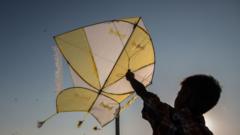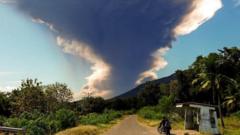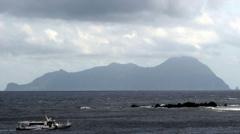The recent eruption of Mount Lewotobi Laki-laki in Indonesia has sent ash plumes soaring to 5,000 meters above sea level with authorities issuing safety warnings. This eruption is significant given its history, particularly the deadly event last year that resulted in 10 fatalities.
Indonesian Volcano Eruption Raises Concerns Amid Previous Fatalities

Indonesian Volcano Eruption Raises Concerns Amid Previous Fatalities
Mount Lewotobi Laki-laki erupts, shooting ash 5,000 meters high, prompting warnings as Indonesia recalls past tragedies linked to volcanic activity.
In a remarkable display of natural power, Mount Lewotobi Laki-laki, located in southeastern Indonesia, erupted on Tuesday night, releasing a massive cloud of ash that ascended at least 5,000 meters (approximately 16,000 feet) into the atmosphere, as reported by the country's volcanic monitoring agency. The ash plume has since been spotted from distances up to 100 miles away, raising concerns among nearby populations.
Fortunately, initial reports indicated that there were no injuries resulting from this eruption, but the government has advised residents to maintain a distance of four to five miles from the volcano to ensure their safety. Authorities have also warned of the potential for related volcanic hazards, such as ashfall or lava flows, especially if rains trigger additional geological activity.
In the lead-up to the eruption, increased volcanic activity was noted, with 50 minor deep earthquakes detected within just two hours — a significant jump from the usual eight to ten quakes reported daily. The likelihood of further seismic disturbances remains a concern following this explosive event.
Indonesia, known for its expansive geography of thousands of islands, is one of the most volcanically active countries worldwide. Much like this recent eruption that recalls last November's tragedy in which ten lives were lost, the impact of volcanic activity continues to shape both the landscape and the lives of local communities.
The naming of the volcano — "Laki-laki" meaning "male" in Indonesian — distinguishes it from its nearby sister mountain, Lewotobi Perempuan, which translates to "female" and has a less frequent eruption history. As the region processes this latest volcanic episode, the government is closely monitoring the situation and the potential ramifications of Mount Lewotobi Laki-laki's activity.




















